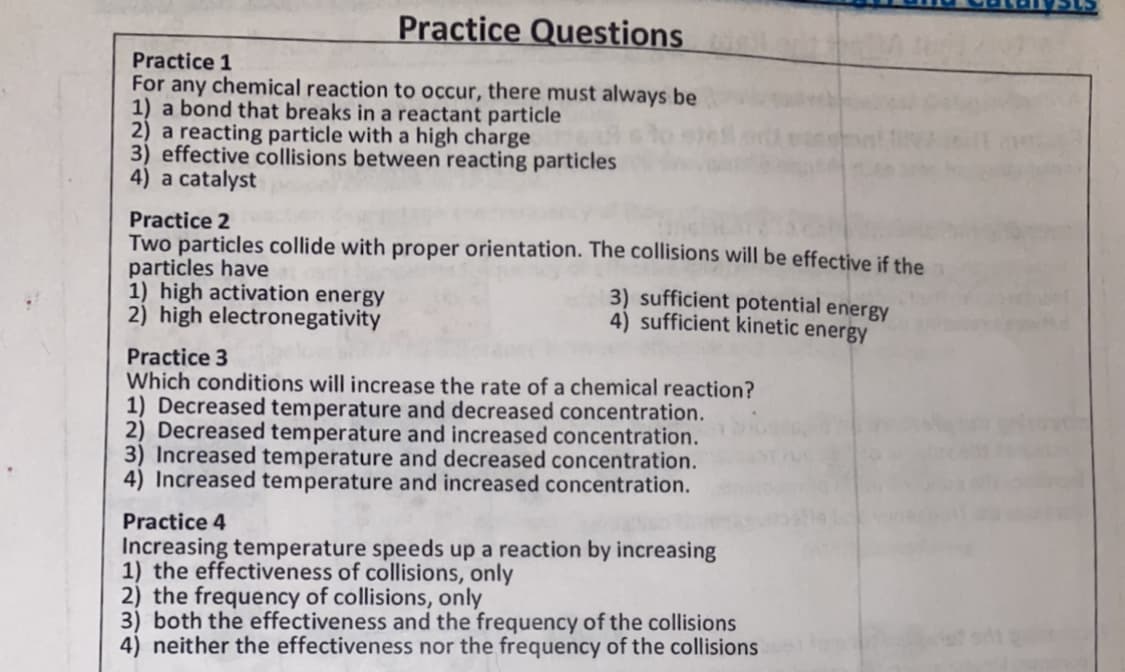Practice 1 For any chemical reaction to occur, there must always be 1) a bond that breaks in a reactant particle 2) a reacting particle with a high charge 3) effective collisions between reacting particles 4) a catalyst
Practice 1 For any chemical reaction to occur, there must always be 1) a bond that breaks in a reactant particle 2) a reacting particle with a high charge 3) effective collisions between reacting particles 4) a catalyst
Chemistry
10th Edition
ISBN:9781305957404
Author:Steven S. Zumdahl, Susan A. Zumdahl, Donald J. DeCoste
Publisher:Steven S. Zumdahl, Susan A. Zumdahl, Donald J. DeCoste
Chapter1: Chemical Foundations
Section: Chapter Questions
Problem 1RQ: Define and explain the differences between the following terms. a. law and theory b. theory and...
Related questions
Question
FYI: #1-4 is like a),b),c) and d)

Transcribed Image Text:Practice Questions
Practice 1
For any chemical reaction to occur, there must always be
1) a bond that breaks in a reactant particle
2) a reacting particle with a high charge
3) effective collisions between reacting particles
4) a catalyst
Practice 2
Two particles collide with proper orientation. The collisions will be effective if the
particles have
1) high activation energy
2) high electronegativity
3) sufficient potential energy
4) sufficient kinetic energy
Practice 3
Which conditions will increase the rate of a chemical reaction?
1) Decreased temperature and decreased concentration.
2) Decreased temperature and increased concentration.
3) Increased temperature and decreased concentration.
4) Increased temperature and increased concentration.
Practice 4
Increasing temperature speeds up a reaction by increasing
1) the effectiveness of collisions, only
2) the frequency of collisions, only
3) both the effectiveness and the frequency of the collisions
4) neither the effectiveness nor the frequency of the collisions
Expert Solution
This question has been solved!
Explore an expertly crafted, step-by-step solution for a thorough understanding of key concepts.
This is a popular solution!
Trending now
This is a popular solution!
Step by step
Solved in 2 steps with 2 images

Knowledge Booster
Learn more about
Need a deep-dive on the concept behind this application? Look no further. Learn more about this topic, chemistry and related others by exploring similar questions and additional content below.Recommended textbooks for you

Chemistry
Chemistry
ISBN:
9781305957404
Author:
Steven S. Zumdahl, Susan A. Zumdahl, Donald J. DeCoste
Publisher:
Cengage Learning

Chemistry
Chemistry
ISBN:
9781259911156
Author:
Raymond Chang Dr., Jason Overby Professor
Publisher:
McGraw-Hill Education

Principles of Instrumental Analysis
Chemistry
ISBN:
9781305577213
Author:
Douglas A. Skoog, F. James Holler, Stanley R. Crouch
Publisher:
Cengage Learning

Chemistry
Chemistry
ISBN:
9781305957404
Author:
Steven S. Zumdahl, Susan A. Zumdahl, Donald J. DeCoste
Publisher:
Cengage Learning

Chemistry
Chemistry
ISBN:
9781259911156
Author:
Raymond Chang Dr., Jason Overby Professor
Publisher:
McGraw-Hill Education

Principles of Instrumental Analysis
Chemistry
ISBN:
9781305577213
Author:
Douglas A. Skoog, F. James Holler, Stanley R. Crouch
Publisher:
Cengage Learning

Organic Chemistry
Chemistry
ISBN:
9780078021558
Author:
Janice Gorzynski Smith Dr.
Publisher:
McGraw-Hill Education

Chemistry: Principles and Reactions
Chemistry
ISBN:
9781305079373
Author:
William L. Masterton, Cecile N. Hurley
Publisher:
Cengage Learning

Elementary Principles of Chemical Processes, Bind…
Chemistry
ISBN:
9781118431221
Author:
Richard M. Felder, Ronald W. Rousseau, Lisa G. Bullard
Publisher:
WILEY